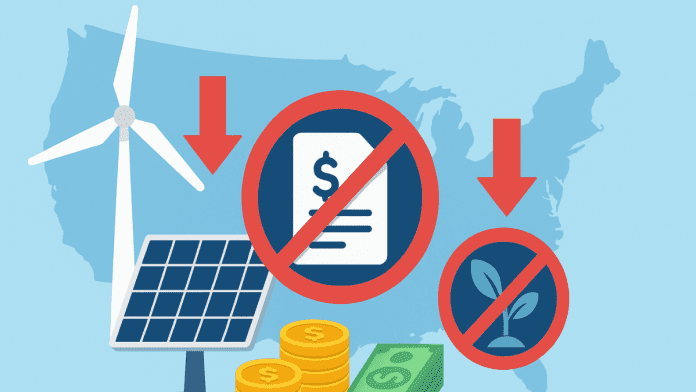🕒 Last updated on October 3, 2025
The White House, led by President Donald Trump, has announced a major cut in federal funding, targeting nearly $8 billion in green energy projects across 16 states that did not vote for him in the 2024 election. This decision has sparked a heated debate, with supporters calling it a necessary step and critics warning about its political nature.
The funding being cut mainly supports renewable energy and climate-related projects. These projects include research on solar and wind power, energy efficiency programs, and new technologies aimed at reducing pollution. States affected by the cuts include California, New York, Washington, Massachusetts, New Jersey, and several others.
Russ Vought, the White House budget director, described the decision as a move to stop funding what he called “Green New Scam” programs that push a political agenda. Officials say that the decision is part of a broader effort to review federal spending and ensure that government money is used efficiently. However, the move comes at a time when federal support for renewable energy has been increasing, raising concerns that this funding cut could slow down ongoing projects.
The new ESG emerges as a force despite Trump’s harsh climate remarks
Details of the Funding Cuts
According to Vought, the $8 billion in funding was planned for projects meant to improve clean energy technology and fight climate change. Energy Secretary Chris Wright has also been involved in reviewing these programs, stating that the department aims to return some unobligated funds to the federal budget.
The Department of Energy has reportedly been reviewing all the projects funded by these programs. Some funds that were already promised to states may be canceled or delayed. Officials have not released a full list of all affected projects, leaving many communities unsure about what this means for local initiatives.
The affected states were told they have a window to appeal the decision. Still, the uncertainty has raised concerns among state leaders, who say that these cuts could affect jobs, research, and the transition to cleaner energy sources.
Reactions and Impacts
The announcement has divided opinion sharply. Supporters of the cuts, including Republican Senator Cynthia Lummis of West Virginia, praised the move, saying it reduces unnecessary government spending. They argue that federal funds should focus on areas that bring immediate economic benefits.
Newsom strikes climate deal with Brazil after Trump calls climate change a con job
Critics, however, see the decision as politically motivated. Democratic Senators Chris Murphy of Connecticut and Ed Markey of Massachusetts warned that targeting states based on how they voted is unfair and could have serious consequences. Many fear that canceling funding for clean energy projects will slow down progress in reducing carbon emissions and may lead to higher electricity costs in the affected areas.
Experts also point out that canceling these projects could affect local economies. Renewable energy projects often create jobs in construction, research, and technology development. With billions of dollars being withdrawn, several communities could face setbacks in both economic growth and environmental progress.
The Department of Energy has said it is reviewing which funds can be returned to the federal budget and which projects may still continue. However, many state officials remain concerned about the immediate impact of the funding cuts.
The $8 billion reduction is part of a larger trend where federal agencies are scrutinizing ongoing programs and reviewing budget allocations. This is happening alongside other federal funding changes, including delayed projects in transportation and infrastructure.

